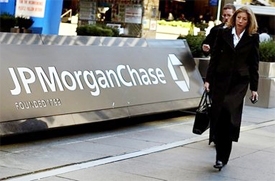US banks close embassy accounts
 Permanent members of the UN Security Council, such as France and China, are among scores of countries told to find a new bank after JPMorgan Chase told diplomatic missions in Washington and New York to close their accounts by March 31.
Permanent members of the UN Security Council, such as France and China, are among scores of countries told to find a new bank after JPMorgan Chase told diplomatic missions in Washington and New York to close their accounts by March 31.
Patrick Kennedy, an under secretary of state, met representatives from more than 150 countries at the UN headquarters to answer worries over the accounts.
He told reporters afterwards that Secretary of State Hillary Clinton and Treasury Secretary Timothy Geithner were involved in efforts to persuade banks to reconsider their decision and to get other banks into the diplomatic business.
US officials have insisted though that the banks had taken a "business decision."
The major powers say they expect to quickly find an alternative bank but dozens of poorer nations, particularly from Africa are already have problems, diplomats said. The accounts are need to pay staff wages and mission bills.
With very little income coming from inside America, the big Security Council members are having to bring in millions of dollars a year for their missions.
JPMorgan Chase, which has a heavy diplomatic clientele as it had a branch at the UN headquarters in New York, is the only bank known to have closed all embassy accounts.
But Bank of America last year cut five accounts held by the Angolan embassy and several other banks have told US authorities they plan to get out of the diplomatic business, the Washington Post reported.
No US bank has yet spoken publicly about the decision, but diplomats say they believe it is because of the high cost of tracking money arriving into the United States for signs of terrorist or other criminal activity.
Robert Rowe, vice president of the American Bankers Association, the main representative group for US banks, blamed growing regulatory pressure to clamp down on corruption and other criminal activity.
"Because of requirements from (government) examiners the banks are being particularly careful" about money arriving from abroad, Rowe told AFP. "Especially when it comes to foreign missions" with "high profile" individuals.
"There is a lot of careful scrutiny now," he said. "It is getting very tough for the banks to tell the good guys from the bad guys."
Rowe said other countries face similar problems accounting for foreign money flows.
The United States has tough legislation against terrorism and crime financing. But the Paris-based Financial Action Task Force, an intergovernmental body, has spread tougher action to many countries.
JPMorgan Chase sent a letter to ambassadors in the United States on September 30 warning that all diplomatic accounts and credit cards would be closed from March 31.
The US government has told ambassadors that it cannot force banks to accept diplomatic business and the US mission to the United Nations has warned embassies that they could have difficulties finding an alternative institution.
What the stars mean:
★ Poor ★ ★ Promising ★★★ Good ★★★★ Very good ★★★★★ Exceptional
 Tag:
Tag:
Related Contents
Latest News
More News
- Cashless payments hit 28 times GDP in 2025 (February 04, 2026 | 18:09)
- SSIAM and DBJ launch Japan Vietnam Capital Fund (February 04, 2026 | 15:57)
- Banks target stronger profits, credit growth in 2026 (February 04, 2026 | 15:43)
- Vietnam on path to investment-grade rating (February 03, 2026 | 13:07)
- Consumer finance sector posts sharp profit growth (February 03, 2026 | 13:05)
- Insurance market building the next chapter of protection (February 02, 2026 | 11:16)
- NAB Innovation Centre underscores Vietnam’s appeal for tech investment (January 30, 2026 | 11:16)
- Vietnam strengthens public debt management with World Bank and IMF (January 30, 2026 | 11:00)
- Corporate bond market poised for stronger growth cycle (January 28, 2026 | 17:13)
- Vietnam's IPO market on recovery trajectory (January 28, 2026 | 17:04)






















 Mobile Version
Mobile Version